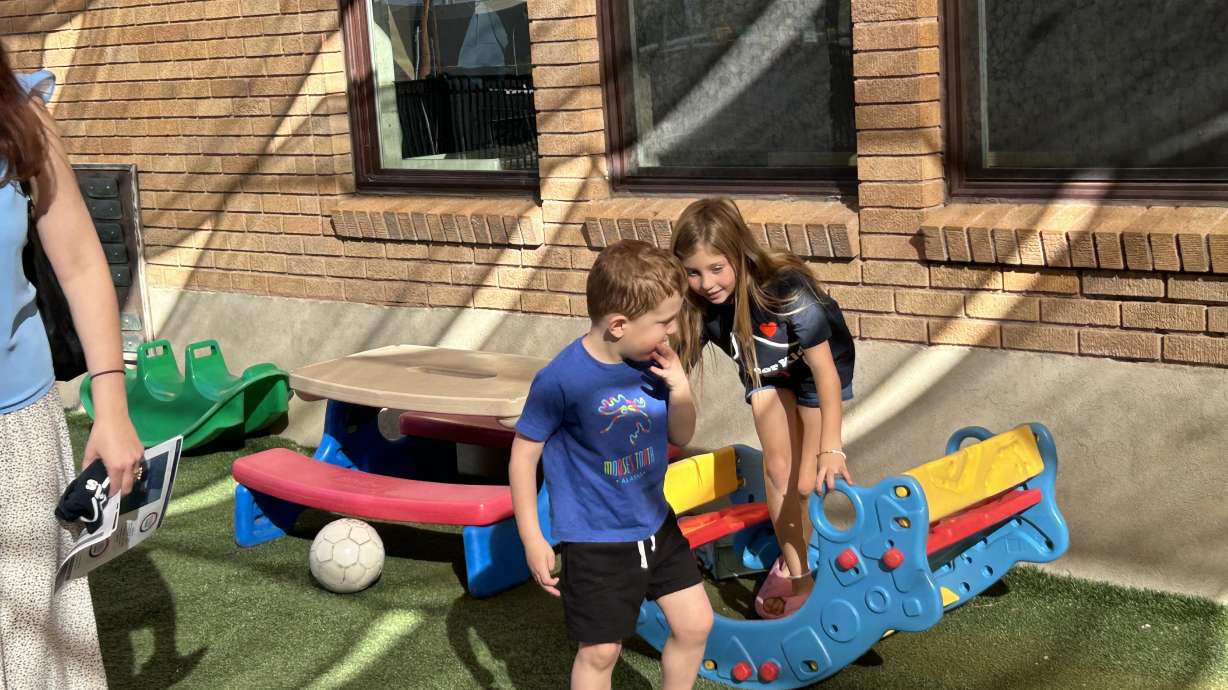Estimated read time: 4-5 minutes
This archived news story is available only for your personal, non-commercial use. Information in the story may be outdated or superseded by additional information. Reading or replaying the story in its archived form does not constitute a republication of the story.
SALT LAKE CITY — Utah parents and child care providers are calling on Utah lawmakers for public investment into the sector as the last of the federal money dries up, sending many families and providers over the "funding cliff."
Utah Care for Kids, a nonprofit, held a rally and letter-writing campaign on Saturday to call for investment into the licensed child care's vital infrastructure, which the group says "has been crumbling for decades."
The sector was temporarily stabilized during the COVID-19 pandemic when the state received nearly $600 million through the federal Child Care Stabilization Grants, which was part of the American Rescue Plan Act.
The child care crisis existed long before the COVID-19 pandemic, with the state only having enough licensed child care workers to meet about 35% of its child care needs. With the help of federal funding and state funding from the Office of Child Care, licensed child care capacity in Utah had grown by 31% since March 2020. The child stabilization grants offered by the Office of Child Care helped providers cover unexpected costs associated with the pandemic, stabilize their businesses and pay their staff members $15 an hour or more.
But now that funding is gone, resulting in hiking tuition prices, child care program closures and parents leaving the workforce.
Sarah Stone, executive director and founder of Wonder Bloom Nature Place Group, took a 25% pay cut when government funding dried up to prevent cutting her educator's wages.
"We relied a lot on the childcare stabilization grant the last few years to help pay our teachers competitive wages," she said. "And this year, with the funding cliff, I didn't want to cut any of our staff or cut their pay."
Stone added that most of Wonder Bloom's revenue goes to pay employees, so it's hard to find any other costs to cut when money gets tight.
The business held a fundraiser Friday night to try and fill in some of the funding gaps. Stone said the goal was just to help make ends meet for the program.
The closure of any licensed child care provider has a huge impact. For every three kids in need of care, there is one licensed child care spot in Utah, with no county in the state having adequate numbers of licensed child care providers. Only 36% of child care needs are met in the state overall, according to Voices for Utah Children's report "Mapping Care for Kids." The report also revealed that in Utah, two of three families need both parents in the workforce to provide basic needs such as housing, food and clothing.
Rising child care costs have begun to rival college tuition, pricing some families out of quality child care or forcing one parent out of the workforce. The lack of child care prompted $1.36 billion in lost economic development in Utah, according to a 2022 U.S. Chamber of Commerce report. Recent data indicates that 60% of moms with children ages zero to 5 are in the Utah workforce, according to Utah Care for Kids.
"Childcare should cost no more than 7% of your income, and we know in Utah they're paying closer to 20-25% of their income," said Rev. Brigette Weier, a Utah Care for Kids organizer.
"Parents feel like they have a little control over the pricing of care, how much care they need," she continued, "and we want parents to have that control, but we want them to have choices that are safe and are the best for their family and child. One of the pieces that we know needs to happen is public investment like in K-12; if parents had to pay for third grade, they would be forced into the same untenable situation."
Recent efforts by the Utah Legislature included raising the number of children allowed in unlicensed care to eight. A background check was required for unlicensed providers, but so far only 16 providers have requested one, according to Utah Care for Kids.
Early child care advocates, educators and parents are asking that the child tax credit be expanded to benefit more than the 1.8% of taxpayers in Utah and to reduce the number of children in unlicensed child care centers. Additionally, the group called on state investment into HB461, which lawmakers passed this year, allowing all child care staff to be eligible for child care subsidies regardless of income. While the bill passed, the state attached no state funding.
"Those are some of the situations that we know parents are in, and we don't want them to feel hopeless and helpless. We need our legislators to hear their voices and to understand that times have changed," Weier said. "It's really almost untenable to have a stay-at-home parent. You cannot make it on one income in Utah, in most places. Housing is high, food is high, everything has gone up but wages."










